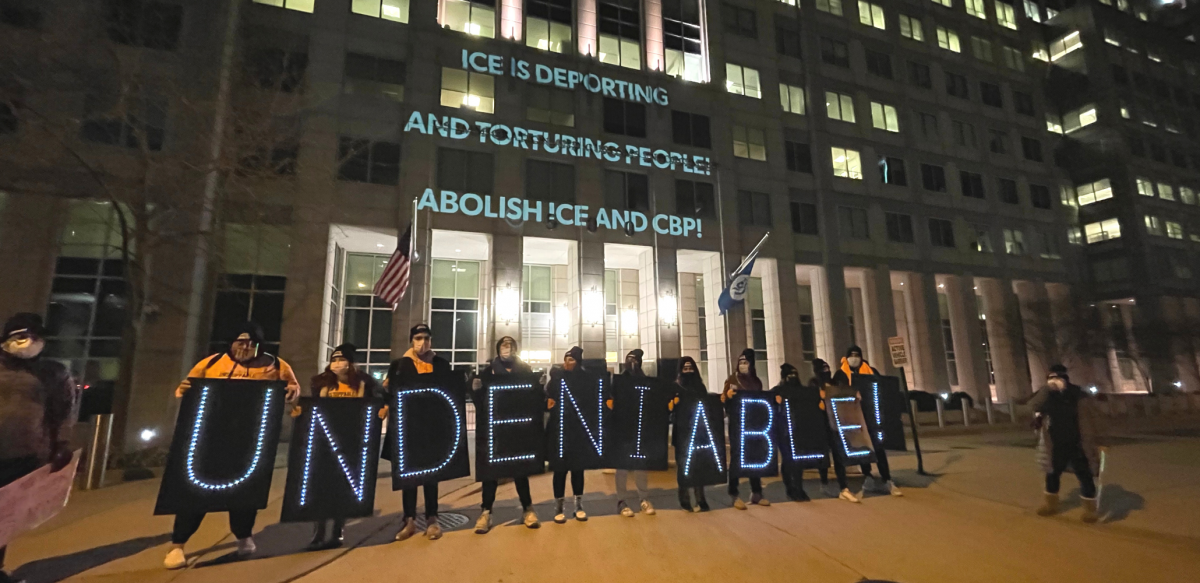Viewpoint: A ‘Union’ That Pushes to Deport People Is the Labor Movement's Opponent

Last night activists protested at the headquarters of Immigration and Customs Enforcement. Since Biden took office the agency has deported 26,248 people. Photo: United We Dream
What if I told you an employer had agreed that it could no longer make any change to policies affecting members without “prior affirmative consent” from the union?
Wow, you might say—that’s what I call worker power! But hold your applause till you hear who the employer is: Immigration and Customs Enforcement, the federal agency that detains and deports immigrants.
The eight-year agreement, signed by an outgoing official on the eve of Biden’s inauguration, was a booby trap, an attempt to lock in Trump’s anti-immigrant regime.
It’s hard to imagine any other situation where an employer would be eager to accept such terms. Meanwhile many public workers don’t even have the legal right to bargain over their wages.
ICE agents are aggressively pro-deportation, more so than their new boss. When a judge temporarily blocked Biden’s moratorium on deportations (not on labor grounds) they wasted no time before they rushed two dozen children to Haiti and tried to send an asylum-seeker back to torture in Cameroon. Since Biden took office they have deported 26,248 people.
It makes me angry to see the trappings of unionism deployed to prop up racist violence and thwart reform. But can we criticize this “union” without slipping into anti-union talking points? Yes.
This is no slippery slope. It’s a chance to clarify what the union movement doesn’t mean.
We shouldn’t be bashful about having a different attitude toward police and border control unions than we do toward teacher and transit unions. There’s a fundamental difference, and the difference is political.
DEADLY TERROR
Workers building power in their own worksites, in their own interests, is a crucial building block of the labor movement. But it’s no movement at all if that’s where we stop.
It matters whether we’re building power for the common good or to collude in the oppression of other workers.
Immigration policy is fundamentally a labor policy. The deportations, the raids, and the permanent limbo are all calibrated to keep a layer of workers marginal enough to accept crummy wages and crummy conditions.
People say immigrants “do the jobs Americans won’t do,” sometimes meant sympathetically. But that makes it sound like immigrants are fundamentally different than non-immigrants somehow—whether tougher and harder-working, or less proud and less safety-conscious. It isn’t true. Immigrants and non-immigrants are the same kind of people, under different circumstances.
On a single day in 2019, ICE workplace raids swept up 10 percent of the town of Morton, Mississippi; 680 poultry workers were fired or arrested, some after dropping off their kids for the first day of school.
This climate of terror is how the industry routinely gets away with horrific hazards, like the chemical leak in January that killed six Georgia poultry workers. Now poultry plants are Covid hotspots.
PICK A SIDE
A recent study from the University of California, San Francisco, reviewed Covid deaths in the state by occupation and industry. Surprisingly, the largest increase in mortality was not among health care workers. The five deadliest jobs were line cook, warehouse worker, farmworker, baker, and construction laborer—jobs that, in California, are often done by immigrants.
You could lay out the same case about mass incarceration; about poverty, urban and rural; about “right-to-work” states. When one group is kept desperate, it undermines standards for all.

SUPPORT LABOR NOTES
BECOME A MONTHLY DONOR
Give $10 a month or more and get our "Fight the Boss, Build the Union" T-shirt.
Our economy runs on this exploitation. We have to transform it—that’s the role of the labor movement. A union that instead props it up is acting as our opponent.
So when cops use their “unions” to protect racism and immigration agents use theirs to promote deportation, they’re fighting for the employers’ interests—and they’re no brothers or sisters of mine.
Corrections: This article has been corrected to clarify that it was a chemical leak, not an explosion, that killed six Georgia poultry workers, and to correct the spelling of Morton, Mississippi.






